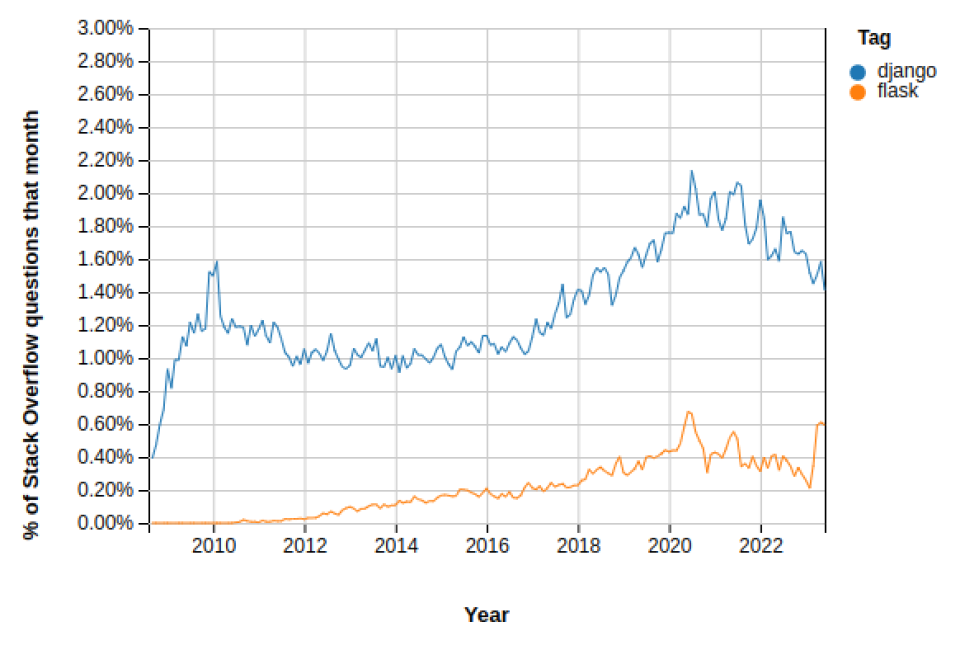In this article, I take a deep dive into Flask vs Django. Want the TL-DR? They’re both open-source web frameworks that use the Python programming language to create and manage web applications, web services, and websites.
Sound intriguing? Great! Not sure what a web application framework is? No problem! I'll cover all of the bases in this Flask vs Django head-to-head.
So, the next time someone assumes that Python is only for analytics and data science, you can tell them that it’s also popular for web development.
Let’s get started with this head-to-head comparison of Flask vs Django in 2024 to see who comes out on top.
Django vs Flask: Head-to-Head
There’s no doubt that Django and Flask are both popular web frameworks, as shown by their ability to wrestle their way into the top 15 frameworks in the latest Stack Overflow developer survey, and that's despite the overwhelming number of JavaScript frameworks that tend to dominate the web development space.

Django & Flask are Top 15 Frameworks: Stack Overflow Developer Survey
Now we know that these two Python frameworks are popular among web developers, let’s figure out the difference between Django and Flask in our Flask Django comparison table.
|
|
Django |
Flask |
|
Launch Year |
2005 |
2010 |
|
Architecture |
Model View Template (MVT) |
Wrapper for WSGI |
|
Framework Type |
Full-stack |
Micro-framework |
|
Working Style |
Monolithic |
Diversified |
|
Flexibility |
Low |
High |
|
Companies Using It |
Spotify, Instagram, Dropbox, Pinterest, Mozilla, YouTube, NASA, National Geographic |
Netflix, Reddit, Uber, Lyft, Zillow, Patreon, Airbnb, MIT |
|
GitHub Stars |
68.4k |
61.7k |
|
Open-Source |
Yes |
Yes |
|
API Support |
No |
Yes |
|
Database Support |
Built-in ORM & support for SQLite, PostgreSQL, MySQL, MariaDB, and Oracle |
Relies on SQLAlchemy or other extensions for ORM |
|
Bootstrapping Tool |
Yes (Django-admin) |
No |
|
Template Engine |
Django Template Language (DTL) |
Jinja2 |
|
Authorization |
Account management & sessions |
Cookies |
|
Multi-Page Apps |
Yes |
No (Single-Page Only) |
|
Dynamic HTML |
Yes |
No |
|
Third-Party App Support |
Yes |
No |
|
Virtual Debugger |
No |
Yes |
|
Testing Support |
Yes (unittest) |
Yes (unittest) |
|
Forms |
Built-in |
Requires Flask-WTF extension |
|
URL Dispatcher |
Controller RegEx |
RESTful |
What Is Django?
Named after jazz guitarist Django Reinhardt (and not the Quentin Tarantino movie!), the Django framework is a full-stack Python-based web application framework released in 2005 to help developers easily create complex database-backed websites and applications.
Sometimes referred to as the framework for ‘fussbudgets with deadlines’, Django is favored for super-fast development. As a full-stack web application framework, it takes a batteries-included approach to let you, the developer, focus on building your web app.
With an agile dev process, the Django framework handles organizing content, site maps, client info, and other ‘basic’ functions to let you focus on building your Python project fast.
Django development is also very DRY (Don’t Repeat Yourself), so expect to reuse components and take advantage of built-in features like logins, database connectivity, database CRUD operations, and more.
Django Key Features

- Versatile: You can use Django to build various Python projects like content management systems (CMS), social networking sites, and even scientific computing platforms.
- Batteries Included: Bundles many useful features out of the box, including a caching framework with Memcached, content admin, site maps, RSS, authentication, and more.
- Portable: Django is written in Python, providing portability to run on any platform.
- Secure: Django bundles robust user authentication systems, and it helps avoid common security issues, such as SQL injection, clickjacking, cross-site scripting, and more.
- Scalable: With a combination of independent layers and DRY principles, code reuse & maintenance enable scalability without issue.
- Adaptability: Support for a variety of formats, including JSON, HTML, XML, and more.
- Popular: Huge companies like Spotify, Instagram, Dropbox, Pinterest, Mozilla, YouTube, NASA, and National Geographic use Django in their tech stack.
What Is Flask?
Arriving in 2010 and developed by Armin Ronacher, the Flask framework is a Python-based micro-framework with minimal dependency on external libraries, allowing developers the flexibility to choose their preferred design pattern, database, plugins, and more.
Initially, Flask was developed to experiment with the integration of the Werkzeug WSGI (Web Server Gateway Interface) toolkit and the Jinja2 template library.
Now a fully-fledged framework that is lightweight and extensible, Flask doesn’t take a ‘batteries included’ approach. This means that developers can search for the extensions or plugins they need without extra weight.
Some would say that Flask is very Pythonic, which is reflected in an easy learning curve. This is particularly clear when you build the time-honored Hello World web app, which only needs a few lines of code, as you'll soon discover when checking out any Flask tutorials.
Flask Key Features

- Lightweight & Extensible: Developers have independence and control over application architecture, libraries, and extensions, along with a neat API.
- Adaptable: Easy to use with any working style, which suits experienced developers.
- Request Handling: Supports HTTP and RESTful requests.
- Testing & Debugging: Integrated unit testing & debugger allow for quick debugging and development.
- Secure Cookies: HTTP request attributes provide security and prevent unauthorized access.
- Flexible & Scalable: Support for WSGI templates allows for flexibility and scalability.
- Popular: Used by large companies like Netflix, Reddit, Uber, Lyft, Zillow, Patreon, Airbnb, and MIT.
Django vs Flask: Pros & Cons
|
Django Pros & Advantages |
Django Cons & Disadvantages |
|
|
|
|
|
|
|
|
|
|
|
|
|
|
|
|
|
|
|
|
|
|
Flask Pros & Advantages |
Flask Cons & Disadvantages |
|
|
|
|
|
|
|
|
|
|
|
|
|
|
|
|
|
|
|
|
|
Which is better, Python Flask or Django?
Maybe you've just finished a Python course, or perhaps you want to flex your programming muscles with some web development, but you're still wondering: Django or Flask, which is better?
There’s no clear answer here, as you’re free to use either Flask or Django with your favorite web development IDE to build your next web app, but it can help to know the best types of projects and scenarios suited to these two Python frameworks.
You should use Django when you need to:
- Work on large projects (multi-page) with strict deadlines
- Use built-in features and gain access support to speed up development
- Build secure projects that require authorization
- Have the option to scale up or make projects more complex in the future
- Create web applications with native ORM support or API backends
You should use Flask when you need to:
- Work on smaller projects (single-page)
- Have varied database support, including NoSQL
- Have flexibility and freedom to choose libraries and extensions
- Have API support or want to add new extensions in the future
- Create static websites, rapid prototypes, and RESTful web services
When thinking about Django versus Flask, it helps to consider whether you’re brand new to Python or web frameworks. In either case, you may find it easier to start with Flask than Django, which has a steeper learning curve and a more rigid approach to creating web applications.
That said, you can use Django books and other resources to overcome this learning curve.
If you plan to build complex apps in the future, it’s well worth learning Django with the wide range of online resources available to you. And if you opt for Django, you can rely on an active community of Django developers who are ready to help if you find yourself in a jam.
This is particularly obvious when you consider that Django is tagged in more than 300k questions on StackOverflow, compared to approximately 55k for Flask.
Despite this differential, both frameworks have trended upwards in StackOverflow questions over the last 10 years, demonstrating growing popularity among web developers.

Django & Flask Have Trended Upwards In Mentions: Stack Overflow
Wrapping Up: Flask vs Django
So there you have it, a comprehensive head-to-head of Flask vs Django for 2024.
If you’re interested in web development and know Python, you’ve likely pondered the question of Flask vs Django for your next project. To help you choose, this article has focused on Flask vs Django in terms of key features, pros and cons, and best use cases.
If you’re still unsure, remember this. Django is a full-stack web framework with a ‘batteries included’ approach that’s excellent for large projects that require security and scalability. If you value flexibility, Flask is ideal as it’s a lightweight and extensible micro-framework that’s great for smaller projects.
There’s no doubt that the Flask vs Django comparisons are unlikely to stop, but whichever you choose, have fun with your next web development project!
Are you new to Python and trying to find the best way to learn? Check out:
The Hackr.io Python Masterclass - Python with Dr. Johns
Frequently Asked Questions
1. Is Flask Easier Than Django?
Most people find Flask easier to learn than Django as it offers greater flexibility and a less rigid working style. But while Django has a steeper learning curve, it can pay off if you build secure and scalable web apps that will grow in complexity.
2. Should I Learn Django or Flask First?
There’s no correct answer here. If you’re new to Python, you may find it easier to learn Flask before Django. Once you have the fundamentals, you’ll find it easier to transition to Django later. On the other hand, if you’re more experienced in Python or web development, you might prefer to dive right into Django.
3. Django vs Flask: Which Is Better?
Neither is better or worse than the other, but they may be better suited to specific use cases. For example, Flask is suitable for smaller projects that need the flexibility to add particular libraries both now and in the future. Django is great for large projects that require security, scalability, and built-in features.
4. Which Is Better? Flask or Django For Beginners?
If you’re a beginner in Python or web development, you’ll likely find that Flask is a more accessible place to start, as it’s much quicker to get your project off the ground due to a smaller codebase and a less steep learning curve.
People are also reading:
